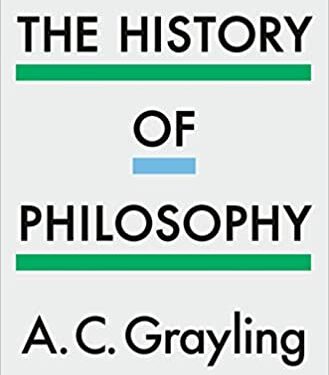A boomerang book is a book to which one often returns. I have several. Here are five: Philosophy and Education by George R. Knight “Why is a school set up like a playground?” “Why does my child have all these projects to do?” “Another field trip! What’s the point?” “Wow! are you sure we need all these books?” “Logic? is that really necessary?” How we, or our children, are educated is very important. But few stop to think about what grounds our choices. We often revert to an appeal to our preferences or our comfort with a particular teacher. George Knight’s book shows how each educational method, teaching style, curriculum,…
-
-
Five of the Best: History of Philosophy Books
It is not strictly true that philosophers only write in the present tense. There are a good number of philosophers who turn their pens from analysis to narrative. Some, in fact, are quite good at it. Here are five of the best histories of philosophy in no particular order. First, a new one: A. C. Grayling’s The History of Philosophy. Grayling, master of New College, London, is a teacher by trade and by nature. He has a unique knack of explaining something quite complicated in an intelligible way. He also writes about the characters of philosophy with a good deal of personal interest. His tone always suggests that he is…
-
Review: The Race Set Before Us: A Biblical Theology of Perseverance & Assurance by Thomas Schreiner and Ardel Caneday
Thomas Schreiner and Ardel Caneday are both New Testament scholars who are deeply committed to pastoral ministry. Schreiner was a pastor for fourteen years and now serves as Professor of New Testament at The Southern Baptist Theological Seminary. Caneday serves as a pastor and is Professor of New Testament studies at Northwestern University. In The Race Set Before Us: A Biblical Theology of Perseverance and Assurance, Schreiner and Caneday defend a Calvinistic view of the perseverance of the saints: It is not possible for a person who is a genuine believer to lose their status as a divinely elected person. The alternative position to this view states that a person…
-
Review: Redeeming Science by Vern Poythress
A Christian worldview maintains that in a sense the world has no bottom. The doctrine of creation out of nothing denies the eternal existence of any ‘prime matter’. There is no matter that is just ‘there,’ before God starts to work. Rather, God created everything, not just structure on top of previously existing prime matter. And God created everything by his word. The word introduces the structure and the meaning. The law of God is the continued structure for the world. The world has no ultimate independence from this word or law of God, but is utterly dependent. Understanding the world does not mean understanding the prime matter, because there…
-
Notes: Body, Soul, and Human Life: The Nature of Humanity in the Bible by Joel Green
Joel Green’s Thesis: “If, as is often alleged, neuroscientists have discredited a dualist interpretation of the human person, I want to explore the usual corollary that, in doing so, they have also discredited the biblical faith. It will become clear that I take the former claim to be true, the latter to be false.”[1] According to Green, the sciences have discredited a dualist ontology of the human person. Green argues that human identity is not grounded in the reference to a substantive, embodied soul but to a set of capacities or functions enabled by a physical base.[2] Green thinks a non-reductive physicalism is compatible with Christian belief and that the…
-
Review: Do More Better by Tim Challies
I read very few practical books. I read these kind of books in situations when I really need them. Doing a Ph.D is one of those situations. At this moment in my life I have so many pieces on my plate yet no external motivating factors to get me to do them. For example, I have a stack of books to read within a three month period. I can read them when I like and in whatever order I like. So I pick up one that I am naturally interested in reading and crack on. It turns out that I approach tasks like a scatter gun. I am either trying to…
-
C. Stephen Evans: Natural Signs and Knowledge of God
According to C. Stephen Evans, natural knowledge of God is “knowledge that does not presuppose any special religious authority or revelation.” A natural sign is “something that directs our attention to some reality or fact and makes knowledge of that fact possible.” Therefore, theistic natural signs are natural signs of God that are the means by which a person becomes aware of God. Theistic Natural Signs (TNS) produce possible de re awareness of God and contain a built in resistible propensity to form a relevant judgment (36). Evans asks: Why do some people accept and some people reject the arguments that proffer signs of the reality of God? His answer contains two…
-
Review: The Evidence for God by Paul Moser
Unsatisfied with natural theology and fideism, Paul Moser attempts to introduce a new kind of evidence for God, an evidence, “appropriate for the reality of a God worthy of worship” (20). Such evidence is personified in human agents as they are transformed by God. His argument is as follows: (1) Necessarily, if a human person is offered and receives the transformative gift, then this is the result of the authoritative power of the divine X of thoroughgoing forgiveness, fellowship in perfect love, worthiness of worship, and triumphant hope (namely, God).(2) I have been offered, and have willingly received, the transformative gift.(3) Therefore, God exits. (200) Revelation of the divine, according…

